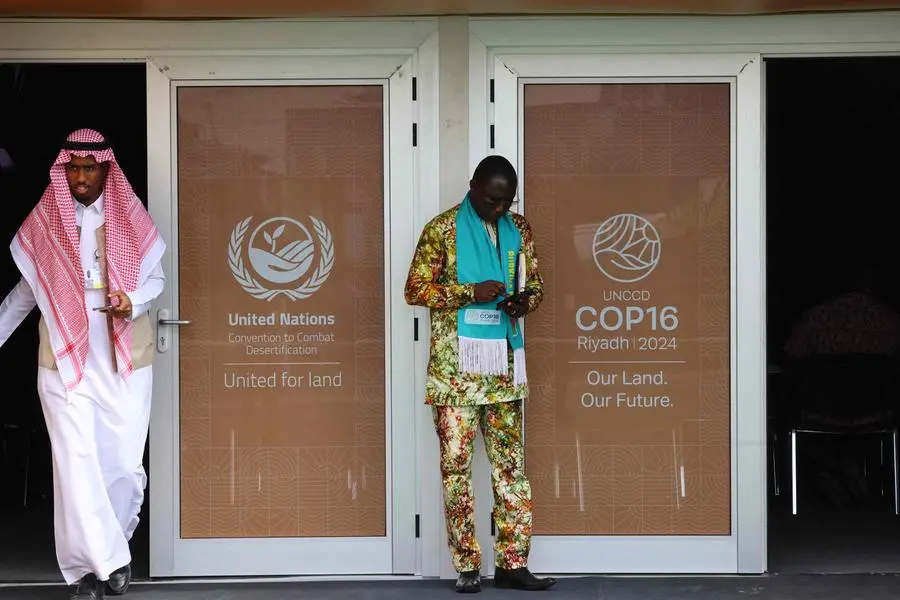PHOTO
RIYADH — Saudi Arabia has officially been elected as the President of the 16th Conference of the Parties (COP16) to the United Nations Convention to Combat Desertification (UNCCD) during the opening ceremony in Riyadh on Monday.
The Kingdom will lead the COP16 for a two-year term to drive international efforts in land rehabilitation, restoration of fertility and vitality, and combating desertification and drought.
The Saudi capital has transformed into a hub for policymakers, international organizations, businesses, NGOs, and key stakeholders seeking urgent solutions to global crises related to land degradation, drought, and desertification.
During the official opening of COP16, Saudi Arabia’s Minister of Environment, Water, and Agriculture and COP16 President Eng. Abdulrahman Al-Fadley emphasized that hosting the conference underscores the Kingdom's commitment to environmental conservation at national, regional, and international levels.
He highlighted alarming global statistics, including the annual degradation of over 100 million hectares of agricultural land, forests, and pastures, affecting more than three billion people and resulting in losses exceeding $6 trillion annually.
In his keynote address, Al-Fadley stated: "The Kingdom is determined to enhance efforts under the UNCCD to address major environmental challenges and foster integration with other international environmental agreements, particularly the Rio Conventions on climate change and biodiversity."
"We aim to achieve ambitious outcomes that create a qualitative leap in preserving land, mitigating degradation, and building resilience to drought, ultimately contributing to global well-being."
He noted that the Middle East is among the regions most affected by land degradation, drought, and desertification. As part of its Vision 2030, Saudi Arabia has prioritized environmental protection, focusing on land degradation and combating desertification.
To achieve these goals, the Kingdom has adopted a National Environment Strategy, established a dedicated Environmental Fund, and launched five specialized environmental centers. These initiatives are supported by updated regulations, programs, and plans to curb pollution, enhance vegetation cover, protect wildlife, manage waste, and advance climate studies.
Al-Fadley pointed out the Saudi Green Initiative’s ambitious targets, including the rehabilitation of 40 million hectares of degraded land and increasing protected areas to 30 percent of the country by 2030.
The initiative was announced in 2021, a year ahead of the global target declared in Montreal in 2022. Additionally, the Kingdom is working to transition 50 percent of its energy mix to renewable sources by 2030 and reduce carbon emissions. Efforts also include a National Water Strategy to ensure water sustainability and recycling, a National Agriculture Strategy to enhance sustainable land management, and a National Food Security Strategy aimed at reducing food loss and waste.
The COP16 President stressed that biodiversity loss and climate change exacerbate challenges to essential life elements like air, water, and food, impacting 1.8 billion people globally and driving migration.
He called for united international action under the UNCCD framework to rehabilitate lands, expand green coverage, adopt innovative solutions, and strengthen partnerships among governments, private sectors, local communities, financial institutions, and NGOs.
“We are optimistic that these efforts will mark a new phase in advancing land preservation and rehabilitation, mitigating drought impacts, and achieving not only the objectives of this convention but also contributing to climate change mitigation, biodiversity conservation, and improved water and food security,” he added.
Al-Fadley expressed gratitude to Côte d’Ivoire for its leadership during COP15 and acknowledged the contributions of the UNCCD Secretariat and all participating nations and organizations.
He emphasized the importance of the strategic framework of the UNCCD for 2018–2030 and called for enhanced methodologies to implement it effectively, particularly in the world’s most affected regions.
The conference agenda includes critical discussions on land degradation, drought, and desertification, underscoring the need for collective global action to build resilience against these pressing challenges.
© Copyright 2022 The Saudi Gazette. All Rights Reserved. Provided by SyndiGate Media Inc. (Syndigate.info).





















